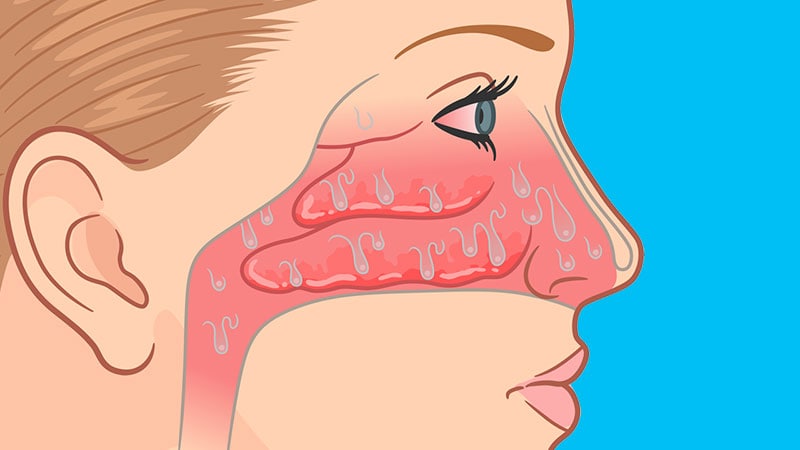Local nasal immunotherapy (LNIT) safely improves clinical symptoms, reduces medication use, and increases the nasal provocation threshold for patients with allergic rhinitis, according to results of a systematic review and meta-analysis.
“The total nasal symptom score and all symptom scores (including nasal obstruction, rhinorrhea, sneezing, and itching) were lower for the LNIT group than for the placebo group,” the study authors write in International Forum of Allergy and Rhinology. “The symptom–medication score and medication score also decreased in the active treatment group. The nasal provocation threshold after LNIT increased significantly.”
Allergic rhinitis is one of the world’s most common health problems, the authors write. Its prevalence is trending upward — it is between 17% and 28.5% in Europe and between 6.9% and 36% in Asia. Although there are various treatments, allergen immunotherapy — repeatedly administering an allergen to modulate the immune response and induce immune tolerance — may offer lasting remission of allergy symptoms and help prevent future asthma and new allergies, according to the American Academy of Allery, Astham and Immunology.
LNIT — which involves administering allergen immunotherapy into the nasal cavity by means other than injection — shows potential as an alternative treatment.
To investigate the efficacy and safety of LNIT for patients with allergic rhinitis, lead author Navarat Kasemsuk, MD, of the Department of Otorhinolaryngology of Mahidol University in Bangkok, Thailand, and colleagues conducted a systematic search of standard medical databases for human studies that compared LNIT and placebo for adults and children with allergic rhinitis. They included all randomized controlled trials published in English that compared the effects of LNIT with control.
Studies of all allergens, preparation types, delivery methods, dosages, and durations were eligible for inclusion, as were studies that evaluated symptom scores, medication scores, serum immunologic assessments, nasal cytokine assessments, nasal provocation thresholds, and adverse events.
Twenty studies met the inclusion criteria. The studies involved a total of 698 participants; ages ranged from 4 to 67 years (the average age was slightly over 30), and slightly over half were male.
Allergic rhinitis was diagnosed on the basis of clinical symptoms, skin prick tests, serum-specific IgE, or nasal provocation tests. Allergies included mite and pollen allergies.
The research team recorded the total nasal symptom score (TNSS), symptom-medication score (SMS), medication score, immunologic assessment, and nasal provocation threshold. The data were pooled for meta-analysis. Results included the following:
-
After treatment, the LNIT group improved more with respect to TNSS, SMS, and medication score compared with controls (TNSS: standardized mean difference, -1.37; 95% CI, -2.04 to -0.69; SMS: -1.55; 95% CI -2.83 to -0.28; medication score: -1.09; 95% CI, -1.35 to -0.83).
-
Immunologic assessments showed similar serum-specific IgE levels in the LNIT and control groups (mean difference, 6.35; 95% CI, -4.62 to 17.31), nasal IgE (-0.59; 95% CI, -1.99 to 0.81), or nasal eosinophil cationic protein (7.63; 95% CI, -18.65 to 33.91).
-
Serum IgG in patients who received LNIT increased significantly (mean difference, 0.45, 95% CI, 0.20 – 0.70). After treatment, the nasal provocation threshold was higher for those who received LNIT (27.30; 95% CI, 10.13 – 44.46). No significant adverse events were found.
As to adverse events, 12 of 14 studies reported mild local reactions, which included sneezing, nasal congestion, runny nose, watery eyes, itching, hives, and local burning sensation.
“According to the favorable outcomes of LNIT and the advancement of the biomedical technique of product development (eg, liposomal nanotechnology for drug carriers), LNIT could be an excellent alternative immunotherapy application route for patients with allergic rhinitis,” the authors write.
Limitations of the study include the risk of bias, the presence of publication bias, and the heterogeneity of the studies.

Dr Kara Coffey
“LNIT is an interesting idea and probably a more palatable alternative than allergy shots for some patients interested in reducing their allergy symptom burden,” Kara E. Coffey, MD, an assistant professor of pediatrics at the University of Pittsburgh School of Medicine in Pennsylvania, told Medscape Medical News in an email.
“But the frequency of adverse effects reported is noted, and I wonder how that will impact long-term patient commitment to therapy,” added Coffey, who was not involved in the study. “I often have a struggle convincing my pediatric patients to even just use saline nose sprays.”

Dr Joshua Levy
Joshua M. Levy, MD, MPH, an associate professor of otolaryngology at the Emory University School of Medicine in Atlanta, Georgia, called the study a comprehensive analysis of the current literature that supports further study.
“Local nasal immunotherapy is an exciting alternative to traditional subcutaneous immunotherapy (SCIT) and sublingual immunotherapy (SLIT) for the control of environmental allergy,” Levy said in an email.
“The results of this study are exciting in that they support continued research into local allergic rhinitis, a difficult-to-treat condition characterized by a local immune response without systemic reactions,” explained Levy, who was not involved in the study. “This results in negative skin and serum testing despite local atopy affecting the nasal mucosa. If local allergen testing and treatment become available, they would significantly advance our ability to care for these patients.
“The clinical significance of these findings could be better supported,” Levy said. “Effect sizes in this study are relatively small, but not significantly different than reported with SCIT and SLIT. Future study using outcome measures with a clearly defined minimal clinically important difference would be helpful.”
The authors recommend further related research.
The study received no financial support. The authors, Coffey, and Levy report no relevant financial relationships.
Int Forum Allergy Rhinol. Published online May 11, 2022. Abstract
For more news, follow Medscape on Facebook, Twitter, Instagram, and YouTube.
Source: Read Full Article
